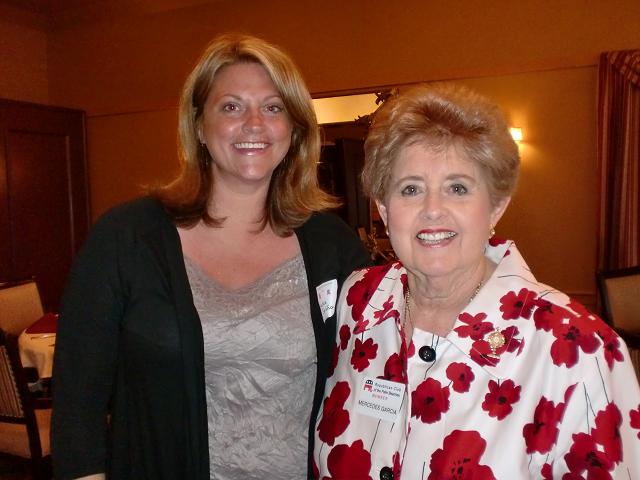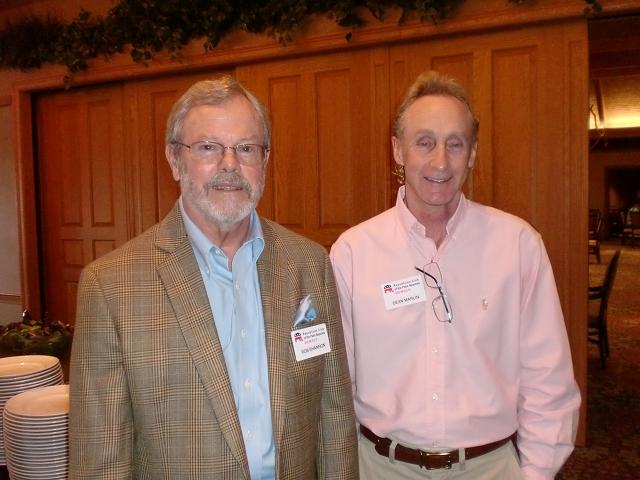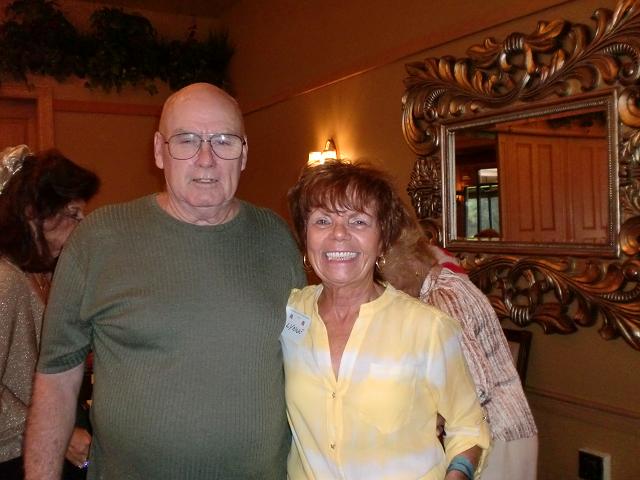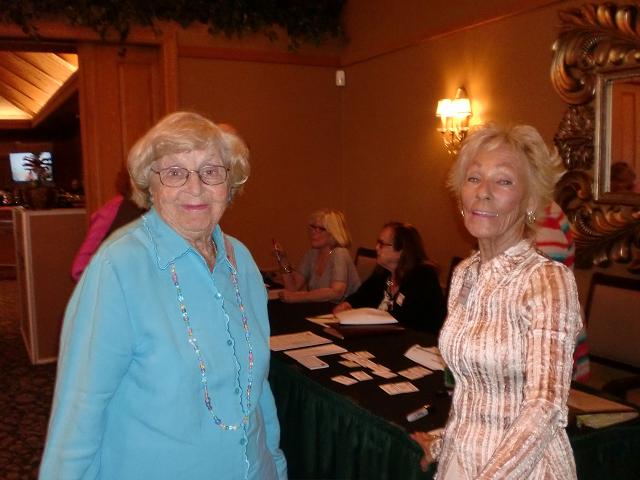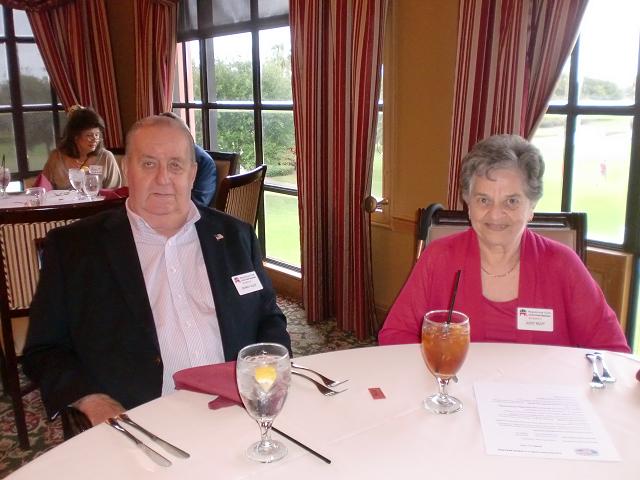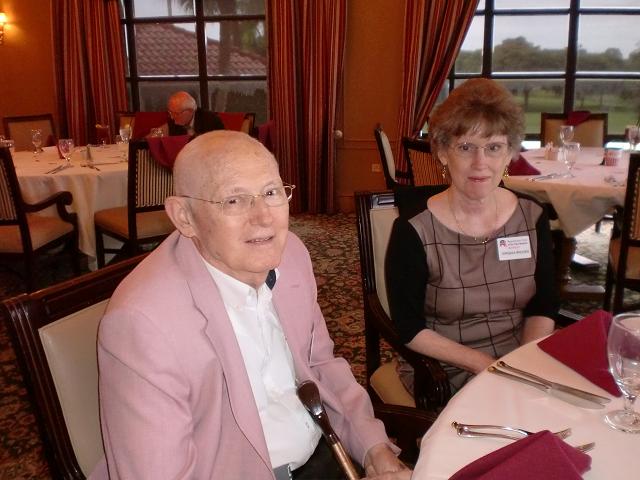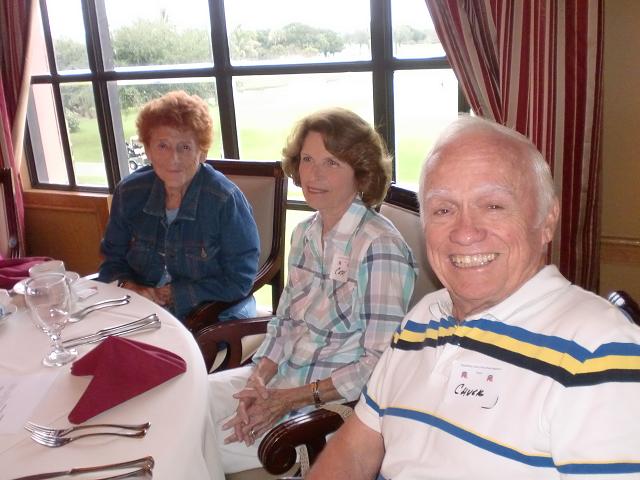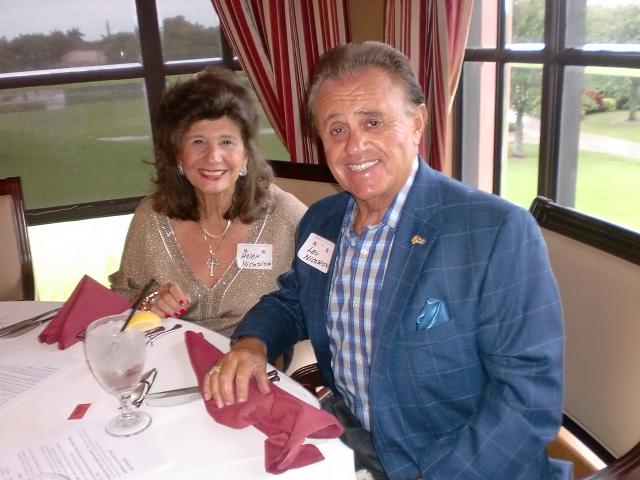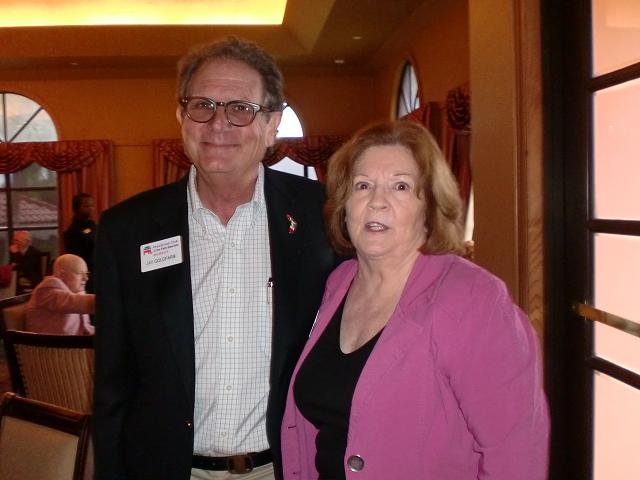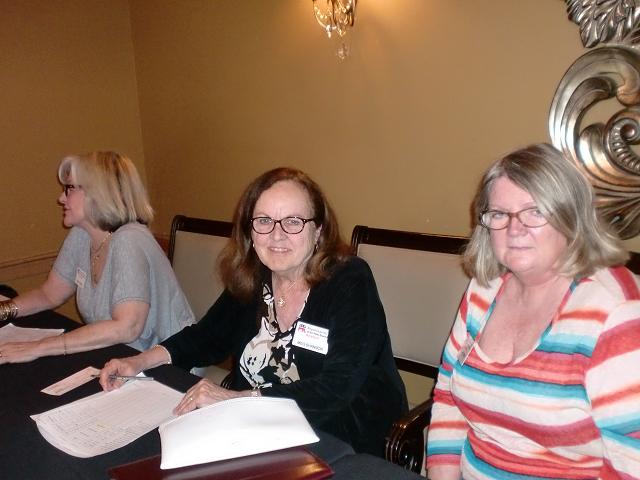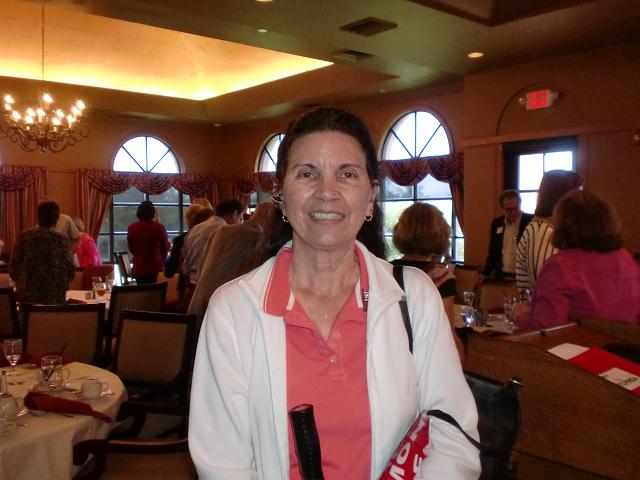A Spirited Discussion About Common Core
As expected, the topic of Common Core led to a spirited discussion by our two speakers, Kate Wallace, Director of Community Engagement for Foundation for Florida’s Future, and Rebecca Negron, a Martin County School Board Member.
Kate described how Florida has made significant gains in educational achievement between 1999 to 2014 with a 24% increase in graduation rates. Further, 30 % of Florida graduates earned a passing score on an AP exam compared to 21.6% nationally, placing Florida third behind only Connecticut and Maryland. On the most recent international student literacy test, Florida ranked second in the world and far above the national average. Our fourth grade math and reading and eighth grade reading improvement is double that of students nationwide.
Higher standards are necessary to prepare students to enter college or the workplace, and the improvement in Florida’s educational results since standards were introduced demonstrate that the higher standards result in higher achievement results.
Kate distinguished among three vocabulary words that are often misunderstood or misused:
1. Standard: The skills we ask to be mastered by a specific grade level
2. Curriculum: A range of approaches to achieve the standards
3. Assessment: The tools to measure objectively whether the standards have been mastered.
As standards change, the curriculum and tests must also change. Children rise to meet standards as they are increased. The progress shown in Florida demonstrates that this works.
Rebecca agreed with Kate that we want our state to be the best in the country in education. Her concern is about the apparent lack of transparency in the development of the standards and curriculum in the past with little involvement of educators and the public. Concerns of various experts point to the Common Core focus being more on writing rather than reading, the failure of the curriculum to develop critical thinking skills, and the developmentally inappropriate programs for children in early grades. Pointing to the design of Common Core, she explained that it is not designed to educate or instruct students using the great stories of western tradition but rather to direct people to be preoccupied with functional aspects.
Rebecca voiced concerns about the Department of Education vetting books for use in the curriculum. Parents are concerned about the biased and negative aspects of human behavior that is found in the curriculum. Teachers also have concerns about the impact on their profession because the evaluations and changes make it hard for them to keep up with the demands. They would like more flexibility to do what they think is best. With regard to the Common Core reading material, she noted that about 70% of it is instructional rather than being good quality literature and only chapters of books are included, rather than entire books.
Rebecca said the most important thing for us to consider is what the purpose of education is. We need to stop having students unready for college, and to educate them so that they grow into respectful and responsible adults. The question we should ask is: “What kind of person do we want to produce?” It will take involvement of all stakeholders, making sure teachers are prepared for teaching to standards, and getting control back to local school districts in all areas. In conclusion, she said that it is good to have this type of discussion because the dialogue is what’s important, we need to identify what our students need to know, and we need to get everyone on board.
In the question and answer period, both speakers agreed that increasing competition is necessary so that parents have a choice in where to send their children for an education. Kate noted that Florida leads the nation in school choice with a variety of traditional schools, charter schools, private schools, on line learning options, and vouchers for pre-kindergarten.
Some pictures by Delia
Fran Hancock Succeeds Rick Kozell as RCPB President at May Meeting
Summary of May 28 Meeting:
The invocation and pledge were done by Michael Barnett.
Rick Kozell, President of the RCPB, thanked Marilynn Parmet and the RCNPB for jointly sponsoring this event. Noting that this year’s Primary Election in less than 3 months away on August 26, Rick pointed out that the notable races were the District 18 Congressional race against a Democratic incumbent in a primarily Republican District. Also noted was the importance of the Governor’s race, with the good news that Florida is leading the nation in job creation and Governor Scott is raising 3 times as much as Charlie Crist.
Future meetings of the RCPB will include another possible joint meeting with RCNPB with Florida CFO Jeff Atwater as the speaker and a Candidate Forum for Districts 18 and 22.
All members were encouraged to join the leadership group, and all were encouraged to state reaching out to undecided voters to get them to support Republican candidates.
Bette Anne Starkey announced the winners of the Anne Roberts Memorial Scholarship Winners, and pointed out that the scholarships will be awarded at our next meeting in June.
Rick Kozell announced, with regret, his resignation as President of the RCPB because he is taking a new job in Washington, D.C. for a couple of years. In conformance with our bylaws, Rick asked for nominations from the floor to fill the office of President. Bill Diamond rose to nominate former State Committeewoman and long time club member, Fran Hancock, with the nomination being seconded by several other club members. After hearing no further nominations from the floor, a motion was made to close the floor to nominations; this motion was seconded and passed without opposition. The vote on the nomination of Fran Hancock was then taken, and she was elected by the club members present without opposition.
The guest speaker was Adam Putnam, the Florida Commissioner of Agriculture and Consumer Services. Focusing on the great importance of keeping the Governor’s office in Republican hands, Commissioner Putnam encouraged the grass roots to start talking to their undecided neighbors about the accomplishments of Governor Scott and the importance of his re-election to Florida, and the business and families who have thrived under the low taxes and reduced regulatory obstructions advanced under his administration.
Candidates for office were then given 3 minutes to speak to the audience. The meeting closed with Rick Kozell thanking the leadership group and the club members for the support and help they provided during his tenure as club President.
Adam Putnam Describes the Stakes in the November Election
Agriculture Commissioner Adam Putnam was the featured speaker at a joint meeting of the Republican Club of the Palm Beaches and the Republican Club of the Northern Palm Beaches, He told the audience that Florida is the last bastion of large states that are not blue in color, and if the Governorship is lost, Florida will look more like Michigan, New York, Ohio and California.
Florida needs to stay conservative by keeping Republicans as the Governor, the Attorney General, the Chief Financial Officer and, the Agriculture Commissioner, and as the majority party in the Florida House and Senate. Pointing out that Republicans are the ones with solutions in the country, he noted that in Florida Republicans have created an environment for businesses to succeed and families to thrive. Palm Beach County is the perfect example of the American Dream. Noting that the current culture of problem solving is fragile, he reminded the audience that just a few years ago Time Magazine had a cover story calling Florida the “Sunset State”, claiming that tourism, real estate, the manufacturing base and diversity in the economy were all dead. At the same time the Wall Street Journal had front page stories claiming that Florida had a 15 to 20 year glut of condos.
Today, 5 years later, with a Republican Governor, Florida leads the nation in job creation, crime is at a 43 year low, and it has a balanced budget after paying off $5 Billion in debt and putting $3 Billion into a savings account in case of hurricanes. Florida and Texas are succeeding, with our chief competitors being states in the southeast like the Carolinas and Tennessee which, like Florida, have low taxes and low regulatory burdens. Florida can set its own destiny, with things in Washington broken for the foreseeable future.
Hilary Clinton, wants a Democratic Governor in Tallahassee to help bolster her presidential run. The potential opponent to Governor Scott is likely to be Charlie Crist who has changed his mind on every single issue of conscience. He has no compass. People can respect leaders who hold beliefs, but someone like Crist undermines public confidence. We need to be energized to keep him from being re-elected as he has morphed from a Republican to an Independent and now to a Democrat. While Crist left the state with many problems when he left the Governorship, we want to make Florida better by improving tourism, engaging in the shale gas revolution, bringing back Pratt Whitney, developing biotech, and creating more medical cities. Florida is not just a prize to be enjoyed later in life, it can be the American Dream now for many people. That’s why our leadership is so important.
Why is having a Republican Governor so important? The Florida Constitution requires that we re-write it every 20 years, so the next Governor will have the right to name half of the committee which will do this. Clubs like ours are in the front line of grass roots activism to keep Republicans in control of our state. In 2010 Republicans were passionate and committed, and this is what is needed this year. Nothing is more persuasive than our supporters talking to their neighbors one-on-one. It is much more important than any advertising done during a campaign. The other side has put legalizing medical marijuana on the ballot to energize their base and increase turnout. We all need to pull together for the good of the state by continuing the pro-business, pro-family environment we have created in Florida.
Peter Feaman – Reasons for Optimism
On Wednesday, March 26, 2014, the Republican Club of the Palm Beaches had our own member Peter Feaman, the elected Palm Beach County’s State Committeeman and Florida’s Republican National Committeeman, as our guest speaker. What a treat! Dismissing doom and gloom, he said we should be excited about things like the recent David Jolly election.Peter talked to us about the positive things that are happening at both the state and national levels of our party. He told us how the Republican party is “getting it” regarding how we can reach potential Republican voters through non-traditional media which was used so successfully by the opposition in 2008 and 2012.
Republicans believe that people who rely on themselves, their families and their god, are going to prosper when government gets out of the way. People are now being told to rely on government, but this is wrong and it has never worked before. As Republicans we must stand up on every front and say that’s wrong, whether it is in a restaurant or the checkout line at the supermarket. We are fighting an entire philosophy.
He pointed out how important the 2014 election will be as a preface to 2016’s election cycle and one key race will be re-electing Governor Rick Scott in 2014. You may have noticed the recent ads being run by RPOF telling the Governor’s compelling story about his background as someone who came from nothing and succeeded on his own merits. It is a truly American story that needs to be told. He has been a good Governor and has significant achievements in increasing employment and tourism, and in decreasing taxes, while caring for those who need help the most.
Republicans need to realize that even if there are areas of disagreement, we need to elect Republicans to office, pointing out that “while pragmatism without principle is surrender, principles without pragmatism is suicide.” The opposition to our view of limited government grew slowly starting with adoption of the income tax in 1917 and we will not turn things around overnight. We can’t change policies until we elect people to govern who can move policies more to the right. Republicans and other conservative voters need to realize that having access to elected Republican officials, who they may view as less than 100% consistent with their views, is far better than having no access to a Democrat who will move on liberal policies without regard for our views.
Financially, the RNC has been successful in raising money in 2013. Instead of hoarding it until the 2016 election, it is spending money now to get the message out and to help get more Republicans elected. It is also building up a staff, most of whom are located outside of Washington, D.C., to lead and organize the boots on the ground effort. For example, the RPOF has an Executive Director who is from Wisconsin, a former blue state which through the work of Scott Walker, Reince Priebus, and Paul Ryan has turned into a red state. If this can be done in Wisconsin, it can be done elsewhere. With the RNC’s new approach, fund raising results, better use of new media, a beefed up staff and tens of thousands of precinct captains throughout the United States, there is a new model in play.
Some pictures from the event:
Meg’s Take on Will Weatherford
The guest speaker at the October 30, 2013 meeting of the Republican Club of the Pam Beaches was the Hon. Will Weatherford, Speaker of the Florida House of Representatives.
Speaker Weatherford started his remarks by noting that we are all less free today as individuals than we were four years ago, and in four years from now we will be even less free than we are today. He saw Florida as a pocket of economic freedom and prosperity that will draw more people to move here in the future. Along with Texas, Florida is coming back faster than the rest of the nation with unemployment coming down. Another good sign is that the graduation rate from Florida high schools has increased and in 2013 it is estimated that 360,000 people will be moving to Florida and forbes rated it as one of the best places to do business. This is not an accident. Instead reflects that the decisions we are making and policies we adopt do matter.
Challenges we face include the following:
1. Education. We must continue to raise the bar and create choice and opportunity for kids to be the drivers of the economy in Florida. There will be a bill in the next legislative session that will make sure that Florida is not part of a national curriculum.
2. Health Care. Some think expanding Medicaid is the answer, but that is a broken system and creates two classes of people. Under Obamacare,if you make over a certain threshold you get coverage from an exchange, but if you are really poor your only option is Medicaid. Florida will be offering a free market alternative.
3. Water. We need to protect our natural resources and be concerned about the quality, consumption and infrastructure of our springs and rivers.
4. Unemployment for our youth. If you are under 30 today, unemployment is almost double what it is for other age groups. If you are African-American and under 30, unemployment is 23%. This exists in part because of the disconnect between the education being provided and what the business community wants. He worries because we are leaving that generation with a $17 Trillion deficit. These young people are forced to sacrifice like earlier generations to make more opportunities for the next generation while bailing out the generation that came before them. We have a moral obligation to talk about what to do for the future of our kids.
5. Lack of upward mobility today. If someone today is in the bottom quartile, they have almost no change of moving up. Government has created haves and have-nots, keeping people down and in poverty. Government has created generational poverty by providing more entitlements and giving more things. Redistribution of wealth is not the answer. We need to provide knowledge and opportunity. A vibrant educational system that gives parents a choice is necessary. If you can’t read by the 3rd grade, you will fail in like. This is a human and civil right. We need to stop attaching free enterprise and instead embrace it. Around the world since 1990, one billion people have come out of poverty. Since 1970 80% of the poverty in the world has been eliminated. The number one cause of this has been the free enterprise system.
If you want to see the difference between a government centric society and a free enterprise society, look at the nighttime pictures of the Korean peninsula. Above the 45th parallel it is darkness and below it is filled with light. We need to believe in our cause.

